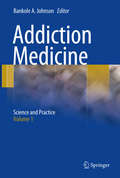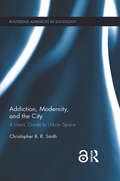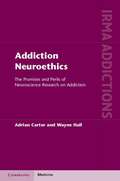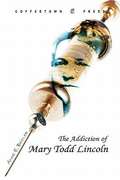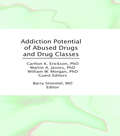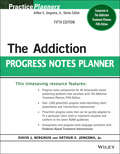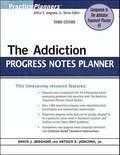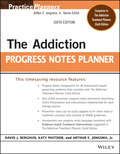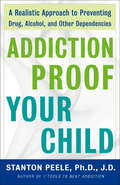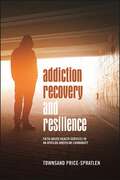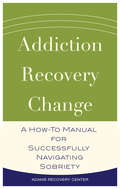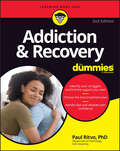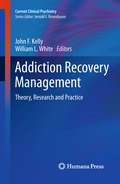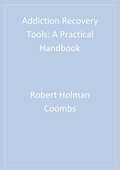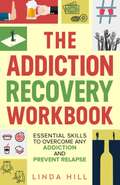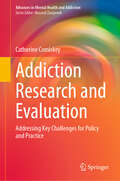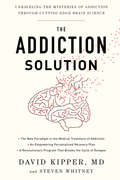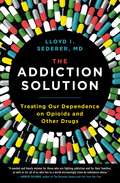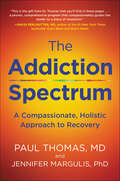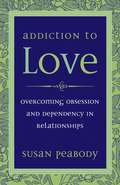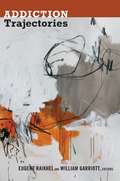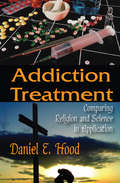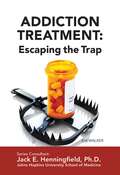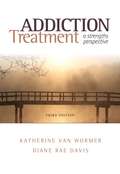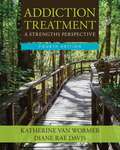- Table View
- List View
Addiction Medicine: Science and Practice
by Bankole A. JohnsonThe spectrum of addiction disorders presents practitioners with numerous challenges--among them the widening gap between a growing evidence base and the translation of this knowledge into treatment outcomes. Addiction Medicine addresses this disconnect, clearly explaining the role of brain function in drug taking and other habit-forming behaviors, and applying this biobehavioral framework to the delivery of evidence-based treatment. Its state-of-the-art coverage provides clinically relevant details on not only traditional sources of addiction such as cocaine, opiates, and alcohol, but also more recently recognized substances of abuse (e.g., steroids, inhalants) as well as behavioral addictions (e.g., binge eating, compulsive gambling, hoarding). Current behavioral and medical therapies are discussed in depth, and the book's close attention to social context gives readers an added lens for personalizing treatment. An international panel of expert contributors offers the most up-to-date information on: Diagnosis and classification Neurobiological and molecular theories of addiction Behavioral concepts of addiction Clinical aspects of addiction to a wide range of substances, including opiates, stimulants, sedatives, hallucinogens, alcohol, nicotine, and caffeine Science-based treatment options: pharmacotherapy, pharmacogenetics, potential vaccines, brief and compliance-enhancing interventions, cognitive behavioral treatment, behavioral management, and other psychosocial interventions Behavioral addictions--including compulsive eating, Internet messaging, and hypersexuality--and their treatment Addiction in specific populations, including adolescents, the elderly, pregnant women, and health care professionals Legal, disability, and rehabilitation issues At once comprehensive and integrative, Addiction Medicine is an essential text and a practice-expanding tool for psychiatrists, health psychologists, pharmacologists, social workers, drug counselors, trainees, and general physicians/family practitioners.
Addiction, Modernity, and the City: A Users’ Guide to Urban Space (Routledge Advances in Sociology)
by Christopher B.R. SmithExamining the interdependent nature of substance, space, and subjectivity, this book constitutes an interdisciplinary analysis of the intoxication indigenous to what has been termed "our narcotic modernity." The first section - Drug/Culture - demonstrates how the body of the addict and the social body of the city are both inscribed by "controlled" substance. Positing addiction as a "pathology (out) of place" that is specific to the (late-)capitalist urban landscape, the second section - Dope/Sick - conducts a critique of the prevailing pathology paradigm of addiction, proposing in its place a theoretical reconceptualization of drug dependence in the terms of "p/re/in-scription." Remapping the successive stages or phases of our narcotic modernity, the third section - Narco/State - delineates three primary eras of narcotic modernity, including the contemporary city of "safe"/"supervised" consumption. Employing an experimental, "intra-textual" format, the fourth section - Brain/Disease - mimics the sense, state or scape of intoxication accompanying each permutation of narcotic modernity in the interchangeable terms of drug, dream and/or disease. Tracing the parallel evolution of "addiction," the (late-)capitalist cityscape, and the pathological project of modernity, the four parts of this book thus together constitute a users' guide to urban space.
Addiction Neuroethics
by Wayne Hall Adrian CarterAddiction is a significant health and social problem and one of the largest preventable causes of disease globally. Neuroscience promises to revolutionise our ability to treat addiction, lead to recognition of addiction as a 'real' disorder in need of medical treatment and thereby reduce stigma and discrimination. However, neuroscience raises numerous social and ethical challenges: * If addicted individuals are suffering from a brain disease that drives them to drug use, should we mandate treatment? * Does addiction impair an individual's ability to consent to research or treatment? * How will neuroscience affect social policies towards drug use? Addiction Neuroethics addresses these challenges by examining ethical implications of emerging neurobiological treatments, including: novel psychopharmacology, neurosurgery, drug vaccines to prevent relapse, and genetic screening to identify individuals who are vulnerable to addiction. Essential reading for academics, clinicians, researchers and policy-makers in the fields of addiction, mental health and public policy.
The Addiction of Mary Todd Lincoln
by Anne E. BeidlerMary Todd Lincoln, wife of the president we have immortalized, has always been difficult for us to understand. She could appear poised and brilliant one moment yet rude and ugly the next. Sometimes competent and strong, able to entertain dignitaries from around the world, at other times she appeared dependent and weak. At times she seemed utterly beside herself with sobbing and screaming. Historians have mostly avoided saying very much about Mary Todd Lincoln except in reference to her husband, Abraham. To many it would seem that Mary Todd Lincoln is still an embarrassment in the tragic story of her martyred husband. But Mary Todd Lincoln lived her own tragic story even before Abraham was murdered. She was an addict, addicted to the opiates she needed for her migraine headaches. Seeing Mary Todd Lincoln as an addict helps us understand her and give her the compassion and admiration she deserves. In her time there had been no courageous First Lady like Betty Ford to help people understand the power of addiction. There was no treatment center. In Mary Todd Lincoln's time there were many addicts at all levels of society, as there are now, but it was a more socially acceptable condition for men to have than for women. More importantly, addiction was not very well understood, and it was often mistreated. Because Mary Todd Lincoln's only surviving son, Robert Lincoln, made a great effort to protect his mother and his family from journalists and historians, he intentionally destroyed most of Mary Todd Lincoln's medical records and many of her letters. What he could not destroy, however, is the record of Mary Todd Lincoln's pain and the record of how she behaved while living with this pain. In The Addiction of Mary Todd Lincoln, we can see clearly, for the first time, what Mary Todd Lincoln had to live with and the courage it took for her to carry on.
Addiction Potential of Abused Drugs and Drug Classes
by Barry StimmelIncrease your awareness of the relative addiction liabilities of various drugs and drug classes that are commonly abused. A timely and masterful new book, Addiction Potential of Abused Drugs and Drug Classes clarifies, in contemporary terminology, the state of addiction liability of cocaine, opiates, alcohol, sedative-hypnotics, nicotine, anxiolytics, marijuana, inhalants and anesthetics, and PCP and hallucinogens--the nine drugs that are most abused today. Authorities combine their research expertise with the available scientific literature to evaluate those factors which contribute to the addictive qualities of drugs. Specific chapters highlight the positive and negative reinforcement qualities that make drugs rewarding, focus on the two major subtypes of alcoholics, and cover the neuroanatomical and neurochemical bases of psychological dependence, the greatest contributing factor to drug addiction. An essential new resource for scientists, clinicians, and administrators, Addiction Potential of Abused Drugs and Drug Classes also highlights those areas where more work is needed in order to understand how individual drugs affect the processes of dependence, tolerance, and addiction, so that adequate treatment of these disorders can be discovered.The book was written for teachers and researchers in the chemical dependency field, to provide an up-to-date review of the literature. In addition, physicians, nurses, and pharmacists will find the book to be valuable as an update on the relative addiction strengths of abused drugs. Finally, treatment counselors and professionals with some knowledge of physiology and pharmacology will be interested in the book because of its relevance to the clinical treatment of chemically-dependent patients.
The Addiction Progress Notes Planner (PracticePlanners #199)
by David J. Berghuis Arthur E. Jongsma Jr.Save hours of time-consuming paperwork The Addiction Progress Notes Planner, Fifth Edition provides prewritten session and patient presentation descriptions for each behavioral problem in the Addiction Treatment Planner, Fifth Edition. The prewritten progress notes can be easily and quickly adapted to fit a particular client need or treatment situation. Saves you hours of time-consuming paperwork, yet offers the freedom to develop customized progress notes Organized around 44 behaviorally based presenting problems including depression, gambling, nicotine abuse/dependence, chronic pain, and eating disorders Features over 1,000 prewritten progress notes summarizing patient presentation, themes of session, and treatment delivered Provides an array of treatment approaches that correspond with the behavioral problems and DSM-5 diagnostic categories in The Addiction Treatment Planner, Fifth Edition Offers sample progress notes that conform to the latest ASAM guidelines and meet the requirements of most third-party payors and accrediting agencies, including CARF, TJC, COA, and the NCQA Incorporates new progress notes language consistent with Evidence-Based Treatment Interventions
The Addiction Progress Notes Planner
by David J. Berghuis Arthur E. Jongsma Jr.PracticePlanners: The Bestselling treatment planning system for mental health professionalsThe Addiction Progress Notes Planner, Third Edition contains complete prewritten session and patient presentation descriptions for each behavioral problem in The Addiction Treatment Planner, Fourth Edition. The prewritten progress notes can be easily and quickly adapted to fit a particular client need or treatment situation.Saves you hours of time-consuming paperwork, yet offers the freedom to develop customized progress notesOrganized around 44 behaviorally based presenting problems, including depression,gambling, nicotine abuse/dependence, anxiety, and eating disordersFeatures over 1,000 prewritten progress notes (summarizing patient presentation, themes of session, and treatment delivered)Provides an array of treatment approaches that correspond with the behavioral problems and DSM-IV-TRTM diagnostic categories in The Addiction Treatment Planner, Fourth EditionOffers sample progress notes that conform to the requirements of most third-party payors and accrediting agencies, including CARF, The Joint Commission (TJC), COA, and the NCQAPresents new and updated information on the role of evidence-based practice in progress notes writing and the special status of progress notes under HIPAA
The Addiction Progress Notes Planner (PracticePlanners)
by Arthur E. Jongsma Jr.An invaluable practice resource for practitioners engaged in addictions treatment In The Addiction Progress Notes Planner, Sixth Edition, a team of distinguished mental health professionals delivers complete, pre-written session and patient presentation descriptions for every behavioral problem in the Addictions Treatment Planner, Sixth Edition. Each note can be simply and quickly adapted to fit a real-world client need or treatment situation while remaining completely unified with the client’s treatment plan. This new edition offers new and revised evidence-based objectives and interventions organized around 46 behavior-based presentations, including alcoholism, nicotine dependence, substance abuse, problem gambling, eating disorders, and sexual addictions. The resource also offers: A wide array of treatment approaches that correspond to the behavioral problems and DSM-V diagnostic categories included in the Addiction Treatment Planner, Sixth Edition Sample progress notes conforming to the requirements of most third-party payors and accrediting agencies, including CARF, TJC, COA, and the NCQA Brand-new chapters on Opioid Use Disorder, Panic/Agoraphobia, and Vocational StressThe Addiction Progress Notes Planner is an indispensable practice aid for addictions counselors, mental health counselors, social workers, psychologists, psychiatrists, and anyone else treating clients suffering from addictions.
Addiction Proof Your Child: A Realistic Approach to Preventing Drug, Alcohol, and Other Dependencies
by Stanton PeeleIn a world where binge drinking, recreational and prescription drug abuse, chronic overeating and anorexia, and Internet gambling and pornography are all too common among teens, it's time to rethink the conventional wisdom about addiction. We clearly need something more than "just say no. " This book is the alternative.
Addiction Recovery and Resilience: Faith-based Health Services in an African American Community (SUNY series in African American Studies)
by Townsand Price-SpratlenWe live in an era of substance misuse colliding with public health shortcomings. Consequences of mass incarceration and other racial disparities of the "drug war" are felt acutely in the neighborhoods and communities least equipped to deal with them. More than 600,000 people are released from US prisons each year; nearly two-thirds of returning citizens have a substance use disorder (SUD) and have limited access to treatment. Even among the general public, only one in ten people with SUD receive any type of specialty treatment. Community organizations make important contributions to improve access and help to heal these societal fractures. Using a social ecology of resilience model, Addiction Recovery and Resilience is a yearslong ethnographic case study of a faith-based health organization with a focus on long-term recovery. It explores the organization's triumphs and missteps as it has worked to respond to the opioid crisis and improve the health of affiliates and the neighborhood for nearly twenty years. Addiction Recovery and Resilience concludes with best practices for individual, organizational, and community health and public policy at a time when nontraditional health care providers are increasingly important.
Addiction, Recovery, Change: A How-To Manual for Successfully Navigating Sobriety (The Adams Recovery Center series #1)
by Adams Recovery CenterAre you working to build a new life of sustained sobriety? Are you a sober support for a loved one who’s trying to move past addiction? Addiction, Recovery, Change: A How-To Manual for Successfully Navigating Sobriety provides the tools you need to meet the everyday challenges of not just getting sober, but staying sober. Based on decades of hands-on clinical experience, Addiction, Recovery, Change addresses the many pitfalls, questions, doubts, and temptations faced by those in recovery and offers tips and information for making it past the most difficult obstacles, such as: *Codependent relationships *So-called “triggers” *Boredom *Lack of strong support networks Addiction, Recovery, Change is a must-read for anyone committed to staying sober, healthy, and on the path of Right Living.
Addiction & Recovery For Dummies
by Paul RitvoNo matter what your road to recovery looks like, Dummies is on your side Addiction and Recovery For Dummies gives you the tools you need to identify and face addiction in yourself or a loved one, while working towards a healthy and realistic approach to recovery. This book offers a compassionate, unbiased, and non-judgmental guide to evaluating and overcoming addiction. You’ll learn to identify the range of addiction levels, the various types (including substance and non-substance), and the possible causes of addiction. An expert author guides you through the range of addiction treatment philosophies and approaches, including twelve-step programs, other in- and outpatient programs, and teen treatments. We’ll also look at common recovery roadblocks, so you’re prepared to overcome whatever hurdles your recovery process brings. Medications, therapeutic communities, self-help groups, long-term recovery strategies—it’s all in here. Learn the signs of addiction and identify the most appropriate treatments Gain advice on offering help to friends or family members struggling with addiction Discover available recovery supports, including groups and medications Understand the media and cultural factors that encourage addiction, and how to avoid themUpdated with the latest treatment options, Addiction & Recovery For Dummies is a valuable resource for those on a recovery journey, and a support guide for the 45 million people who are directly impacted by addiction.
Addiction Recovery Management: Theory, Research and Practice (Current Clinical Psychiatry)
by John F. Kelly William L. WhiteAddiction Recovery Management: Theory, Research, and Practice is the first book on the recovery management approach to addiction treatment and post-treatment support services. Distinctive in combining theory, research, and practice within the same text, this ground-breaking title includes authors who are the major theoreticians, researchers, systems administrators, clinicians and recovery advocates who have developed the model. State-of-the art and the definitive text on the topic, Addiction Recovery Management: Theory, Research, and Practice is mandatory reading for clinicians and all professionals who work with patients in recovery or who are interested in the field.
Addiction Recovery Tools: A Practical Handbook
by Dr Robert Holman CoombsAddiction Recovery Tools: A Practical Handbook presents verified recovery tools with a methodical "when and how" approach for each available tool. Including both Western and Eastern methods, the book catalogs the motivational, medical-pharmaceutical, cognitive-behavioral, psychosocial, and holistic tools accessible in a wide variety of settings and programs.
The Addiction Recovery Workbook: Essential Skills to Overcome Any Addiction and Prevent Relapse
by Linda HillAddiction recovery requires a rewiring of your mind and a strong commitment to change. This can be a challenging process, but with the right guidance, a life free from the suffocating grip of addiction is within reach. <P><p> The Addiction Recovery Workbook provides the structured and proven frameworks that you need to follow to achieve lasting results. This guide: <p>• Explains the science behind addiction, how it affects the brain, and how to overcome it. <p>• Outlines common symptoms of addiction so you can become aware of them before they worsen. <p>• Identifies risk factors for addiction so you don’t self-sabotage your recovery. <p>• Provides in-depth information on Cognitive Behavioral Therapy (CBT) and its various techniques that have helped countless people end their addictions. <p>• Guides readers through the principles of <p>• Acceptance and Commitment Therapy (ACT) and how to use mindfulness, cognitive diffusion, and value clarification. <p>• Explains Exposure and Response Prevention Therapy (ERP) that will help you manage even the most powerful cravings. <p>• Covers the causes of relapse and how to prevent it, including tips for avoiding triggers and maintaining a healthy lifestyle. <p>• Explains how to build your support networks during recovery, including practical advice for building and maintaining positive relationships. <p>• Offers case studies and real-world examples to illustrate the concepts and techniques covered in the book. <P><p> This comprehensive guide offers practical, evidence-based techniques and exercises that will help you gain insight into your addiction and develop the skills you need to overcome it. <P><p> Explore all aspects of addiction recovery, including self-awareness, stress management, mindfulness, communication skills, and more. With interactive activities and journal prompts, readers will deepen their understanding of addiction and develop the skills needed for recovery. <P><p> Whether you're seeking to overcome addiction yourself or seeking to help a loved one, The Addiction Recovery Workbook is an essential tool for anyone looking to take back control of their life.
Addiction Research and Evaluation: Addressing Key Challenges for Policy and Practice (Advances in Mental Health and Addiction)
by Catherine ComiskeyAccording to the United Nations Office of Drugs and Crime, around 284 million people aged between 15 and 64 years used drugs in the year 2020. In addition, it is estimated that over 11 million people were injecting drugs and half of these were living with hepatitis C. Young people are using more drugs than previously, and numbers have increased over the past decade. While numbers are estimated at a global level, there remains little evidence for practitioners and policy makers on key questions, such as how many people are using drugs that are hidden and haven’t contacted services. Questions include the challenging topics of providing safe injecting spaces and drug consumption rooms. As populations age in some regions, questions arise on the nature of substance use among older people. Countries with younger populations are concerned about estimates on the numbers of children potentially impacted by parental substance use and how to engage with them. Awareness of trauma informed services is increasing and questions arise on the impact of domestic abuse or adverse childhood experiences on people who use drugs and their families. Globally, there is a growing concern on how to inform the debate on cannabis policies and how to assess if the chosen policy will be acceptable to the general population. The aim of this book is to provide researchers, service providers and policy makers with a step-by-step guide to robust methodologies and illustrative case studies to address these challenges. The objective of each chapter is to answer a key question, provide a summary of the background evidence, demonstrate through a series of logical steps how to obtain national or local evidence, and finally illustrate the process with detailed, real life case studies. As addiction is encountered across a wide range of professions and civil society organizations, this book will be an essential textbook for graduate students of medicine, nursing public health, addiction, psychology and health and social care professions. It will be a guiding reference book for international, national and local commissioners and providers of related policies and services. At a local level the step-by-step case studies will provide an easy to follow framework for those wishing to apply the methods to benefit and improve their own practice, service or policy.
The Addiction Solution: Unraveling the Mysteries of Addiction through Cutting-Edge Brain Science
by David Kipper Steven WhitneyA revolutionary and empowering paradigm in treating addiction based on groundbreaking new science.For decades addiction has been viewed and treated as a social and behavioral illness, afflicting people of "weak" character and "bad" moral fiber. However, recent breakthroughs in genetic technology have enabled doctors, for the first time, to correctly diagnose the disease and prove that addiction is an inherited, neuro-chemical disease originating in brain chemistry, determined by genetics, and triggered by stress.In their groundbreaking The Addiction Solution, David Kipper, MD, and Steven Whitney distill these exciting findings into a guide for the millions of adults who want to be free from the cycle of addiction, and for their loved ones who want to better understand it and to help. It draws on composite case histories to illustrate how the innovative Personal Recovery Program works by customizing treatment for a diverse group of addicts abusing a wide variety of different substances—from the first day of treatment to its successful resolution. The result is a complete guide to a world made brand-new by this enormous paradigm shift in the treatment of addiction.
The Addiction Solution: Treating Our Dependence on Opioids and Other Drugs
by Lloyd SedererA groundbreaking examination of addiction from a psychiatrist and public health doctor, offering practical, proven solutions for individuals, families, and communities dealing with substance use and abuse.Written with warmth, accessibility, and vast authority, The Addiction Solution is a practical guide through the world of drug use and abuse and addiction treatment. Here, Lloyd I. Sederer, MD, brings together scientific and clinical knowledge, policy suggestions, and case studies to describe our current drug crisis and establish a clear path forward to recovery and health. In a time when so many people are affected by the addiction epidemic, when 142 people die of overdoses every day in the United States, principally from opioids, Sederer’s decades of wisdom and clinical experience are needed more than ever before. With a timely focus on opioids, Sederer takes us through the proven essentials of addiction treatment and explains why so many of our current policies, like the lingering remnants of the War on Drugs, fail to help drug users, their families, and their wider communities. He identifies a key insight, often overlooked in popular and professional writing about addiction and its treatment: namely, that people who use drugs do so to meet specific needs, and that drugs may be the best solution those people currently have. Writing with generosity and empathy about the many Americans who use illicit and prescribed substances, Sederer lays out specific, evidence-based, researched solutions to the prevention and problems of drug use, including exercise, medications, therapy, recovery programs, and community services. In this challenging time, The Addiction Solution provides practical help, comfort, and hope.
The Addiction Spectrum: A Compassionate, Holistic Approach to Recovery
by Paul Thomas Jennifer Margulis"If anyone you know is struggling with addiction—or if you think you might have a problem—you want to read this book.”—GARTH STEIN, bestselling author of The Art of Racing in the Rain"a proven, comprehensive program that compassionately guides the reader to a place of resolution"—DAVID PERLMUTTER, MD, #1 New York Times bestselling author of Grain Brain, and, Brain Maker "a massive achievement and a giant step forward for addiction medicine"—ANNIE GRACE, author of This Naked Mind Drug overdose is now the leading cause of death for Americans under fifty. Even as opiate addiction skyrockets, more people than ever before are hooked on alcohol, sedatives, cigarettes, and even screens. The face and prevalence of addiction has changed and evolved, but our solutions to addiction are stuck in the past. We’ve been treating addiction as a black or white issue, a disease you either suffer from or will never suffer from. The problem with this model is that it doesn’t account for the incredible forces working against all of us, pushing all of us toward addiction: stress, undernourishment, sleep-deprivation, vitamin D deficiency, and isolation, not to mention a flawed medical system and corrupt pharmaceutical companies doling out prescriptions at every turn.The truth: Addiction is a disease that, like many others, exists on a spectrum. We are more vulnerable to becoming addicted to substances at certain points in our lives and based on the evidence provided in The Addiction Spectrum, most effective at kicking addiction when we take a holistic approach. With the help of the 13-point plan and individual protocols detailed in this book, you have the power to change your destiny. No one understands this more than Dr. Paul Thomas, who recovered from alcohol addiction early in his career and founded one of the most effective rehabilitation centers for teens and young adults in his hometown of Portland, OR. Named one of the top family doctors and one of the top pediatricians in the country, Dr. Paul is also board-certified in both integrative medicine and addiction medicine. This unique combination of specialties is intentional: Dr. Paul has devoted his entire life and career to saving lives.Using the best conventional medicine alongside the new science of alternative health, Dr. Paul has treated thousands of patients with the life-saving solutions provided in The Addiction Spectrum. Addiction is a compendium of often devastating circumstances that have gone unchecked by society for far too long. This book is a positive light and guide to overcoming not only addiction but the challenges and obstacles that affect us all.
Addiction to Love: Overcoming Obsession and Dependency in Relationships
by Susan PeabodyLove addiction manifests in many forms, from Fatal Attraction-type obsessive lust to less extreme but nonetheless psychologically and emotionally harmful forms. The most common of these is staying in a bad relationship because of a fear of being alone-the "I hate you but don'¬?t leave me" relationship. In ADDICTION TO LOVE, recovering love addict Susan Peabody explains the variety of ways this disorder plays out, from the obsessively doting love addict to the addict who can'¬?t disentangle from an unfulfilling, dead-end relationship. Peabody provides an in-depth and easy-to-follow recovery program for those suffering from this unhealthy and often dangerous addiction and explains how to create a loving, safe, and fulfilling relationship.A seminal work on unhealthy and obsessive behaviors in love, and how to change behavior to have a positive relationship. This third edition includes a new introduction and revisions to the text throughout.Some symptoms of love addiction include love at first sight, excessive fantasizing, abnormal jealousy, nagging, and accepting dishonesty.Even relationships with parents, children, siblings, or friends may be addictive-dependency is not always related to romantic love.Previous editions have sold more than 40,000 copies."Love addiction is a three-headed serpent that Susan Peabody adeptly slays. This is the quintessential book for any love addict or counselor needing to fully understand this highly prevalent and complex disorder. Susan detects and dissects aspects of this condition not comprehended in other books of its kind. Recovery is possible. This book makes it possible to take the succinct steps necessary toward a loving and reciprocal long-term intimate relationship."-Sudi Scull, M.F.T., C.N., psychotherapist and nutritionistFrom the Trade Paperback edition.
Addiction Trajectories
by Raikhel Eugene Garriott WilliamBringing anthropological perspectives to bear on addiction, the contributors to this important collection highlight the contingency of addiction as a category of human knowledge and experience. Based on ethnographic research conducted in sites from alcohol treatment clinics in Russia to Pentecostal addiction ministries in Puerto Rico, the essays are linked by the contributors' attention to the dynamics--including the cultural, scientific, legal, religious, personal, and social--that shape the meaning of "addiction" in particular settings. They examine how it is understood and experienced among professionals working in the criminal justice system of a rural West Virginia community; Hispano residents of New Mexico's Espanola Valley, where the rate of heroin overdose is among the highest in the United States; homeless women participating in an outpatient addiction therapy program in the Midwest; machine-gaming addicts in Las Vegas, and many others. The collection's editors suggest "addiction trajectories" as a useful rubric for analyzing the changing meanings of addiction across time, place, institutions, and individual lives. Pursuing three primary trajectories, the contributors show how addiction comes into being as an object of knowledge, a site of therapeutic intervention, and a source of subjective experience. Contributors. Nancy D. Campbell, E. Summerson Carr, Angela Garcia, William Garriott, Helena Hansen, Anne M. Lovell, Emily Martin, Todd Meyers, Eugene Raikhel, A. Jamie Saris, Natasha Dow Schüll
Addiction Treatment: Comparing Religion and Science in Application
by Daniel E. HoodAddiction Treatment is an ethnography that compares two types of residential drug-free treatment programs-religious, faith-based programs and science-based, secular programs. Although these programs have originated from significantly different ideological bases, in examining the day-to-day operations of each, Daniel E. Hood concludes that they are far more alike than they are different. Drug-free treatment today, whether in secular or religious form, is little more than a remnant of the temperance movement. It is a warning to stop using drugs. At its best, treatment provides practical advice and support for complete abstinence. At its worst, it demeans users for a form of behavior that is not well understood and threatens death if they do not stop. Hood argues that there is no universal agreement on what addiction is and that drug abuse is little more than a catch-all term of no specific meaning used to condemn behavior that is socially unacceptable. Through extensive participatory observations, intimate life history interviews, and informal conversations with residents and staff, Hood shows how both programs use the same basic techniques of ideological persuasion (mutual witnessing), methods of social control (discourse deprivation), and the same proposed zero tolerance, abstinent lifestyle (Christian living vs. Right living) as they endeavor to transform clients from addicts to citizens or from sinners to disciples.
Addiction Treatment: Escaping the Trap (Illicit and Misused Drugs)
by Ida WalkerIn the United States and Canada, millions of individuals have problems with substance abuse. In some cases the problems are relatively minor, but in others, that abuse leads to addiction. Addiction is a serious and costly disease. In Addiction Treatment: Escaping the Trap, you will learn some definitions important in the study of addiction treatment. You will also learn about the history of addiction treatment, including the work and continuing influence of the Washingtonians, the Emmanuel Movement, the Oxford Movement, and of course, Alcoholics Anonymous. Treatment philosophies are also presented in this book Not all treatment methods are alike, and successful addiction treatment combines a variety of approaches. In Addiction Treatment, you will learn that recovery is an ongoing process, and read about suggestions on how to maintain a sober life.
Addiction Treatment: A Strengths Perspective (Third Edition)
by Katherine Van Wormer Diane Rae DavisThis book covers the biological, psychological, and social aspects of alcoholism, eating disorders, compulsive gambling, and other addictions.
Addiction Treatment: A Strengths Perspective (Fourth Edition)
by Katherine Van Wormer Diane Rae DavisADDICTION TREATMENT covers the biological, psychological, and social aspects of alcoholism, eating disorders, compulsive gambling, and other addictions. The authors bridge the gap between the popular twelve-step and harm-reduction approaches, thus illuminating how you, as a future practitioner, can guide your clients down a trusted path that is tailored towards the client's particular needs. Through a number of first-person narratives about the experience of addiction, you will discover a realism and depth not commonly found in textbooks. Interesting and relevant topics -- such as the case against so-called underage drinking laws and an inside story of working in a casino -- draw you into the material and illustrate the importance of reducing harm within the biopsychological framework that ties the text together.
